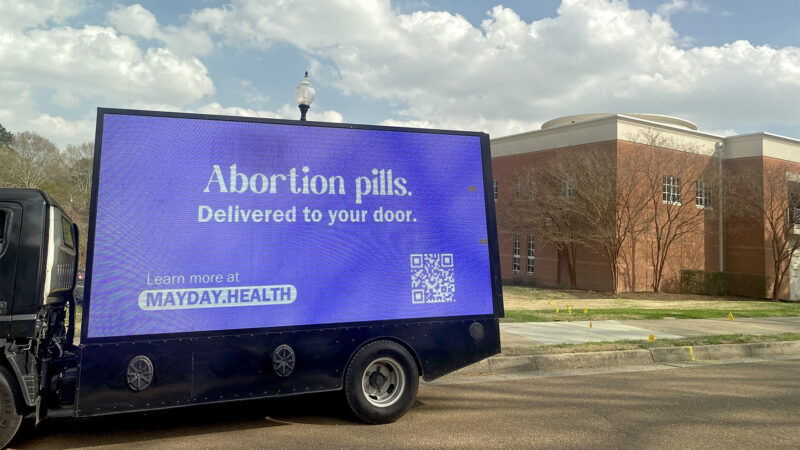These billboards want you to know how to get abortion pills — even if your state banned abortions
Mayday.Health visited Belhaven University on the first of a three-day tour, in Jackson, Mississippi, March 1, 2023. The mobile billboards promote how to safely order abortion pills and feature a QR code that directs people to resources specific to the state they want the pills delivered.
As Women’s History Month gets underway, mobile billboards are visiting college campuses in 14 states with abortion bans carrying a reminder that abortion pills are still accessible all across the country.
Mayday.Health, a nonprofit launched last year after legal abortions were heavily restricted or banned in 26 states, was created to provide information on where and how to safely order abortion pills. The traveling billboards are fitted with QR codes that direct people to resources specific to the state where they are hoping to have pills delivered.
The process can be cumbersome to navigate — involving forwarding mail between states, depending on abortion laws, or waiting weeks for an international prescription.
“We do not pretend that they are perfect,” said Dr. Jennifer Lincoln, executive director and president of Mayday. “We wish that everybody could just get these medications as easily as you can get Tylenol or Viagra in this country. Where there’s a will, there’s a way.”
Lincoln, an OB-GYN from Portland, Oregon, hopes that by showing up in states with strict abortion bans, these billboards will raise awareness that there are still options for reproductive care. Using her privilege as a health care provider in a protected state, she also wants to engage students and keep the momentum for the reproductive fight going.
Abortions have been banned in the Gulf States since last June, but access was already heavily restricted and inequities in reproductive health care overall run deep. Rural counties suffer from minimal access to health care, and maternal and infant mortality rates continue to be some of the highest in the country.
“In Mississippi and Louisiana, in Alabama, in these Gulf states, we know that in these areas we’re already struggling with access to care, with maternity care deserts — that people are already struggling to get the health care they need,” Lincoln said.
Lincoln said women do not have to wait for a crisis to order abortion pills or emergency contraception, but can order and store them “to know you’ve got this in your back pocket.”
The mobile billboard tour is happening against the backdrop of a lawsuit filed in federal court in West Virginia that could have national implications. GenBioPro, a manufacturer of one of the duo of pills taken for a medication abortion, argues it is unconstitutional for the state to ban the drug and that federal oversight takes precedence over state law.
While abortion pills remain illegal to prescribe in places with abortion bans, the Department of Justice maintains that it is legal to mail pills across state lines.
“It’s exhausting, but we are going to do it. We have to, because I look at my kids and these younger generations, and we won’t give up until we get our rights back,” Lincoln said.
The Mayday billboards will be traveling around these states with abortion bans over the coming days:
- Jackson, Mississippi
- Montgomery, Alabama
- Baton Rouge and New Orleans, Louisiana
- Nashville, Tennessee
- Austin and Dallas, Texas
- Augusta and Savannah, Georgia
- Little Rock, Arkansas
- Charleston, West Virginia
- Frankfort and Louisville, Kentucky
- Boise, Idaho
- Jefferson City and St. Louis, Missouri
- Madison, Wisconsin
- Oklahoma City, Oklahoma
- Pierre, South Dakota
Visit Mayday.Health online or on Twitter and Instagram for more information.
This story was produced by the Gulf States Newsroom, a collaboration between Mississippi Public Broadcasting, WBHM in Alabama, WWNO and WRKF in Louisiana and NPR. Support for reproductive health coverage comes from The Commonwealth Fund.
40 years after ‘Purple Rain,’ Prince’s band remembers how the movie came together
Before social media, the film Purple Rain gave audiences a peak into Prince’s musical life. Band members say the true genesis of the title song was much less combative than the version presented in the film.
Park Fire in California could continue growing exponentially, Cal Fire officer says
Cal Fire has confirmed that over a hundred structures have been damaged in the Park Fire, which grew overnight near Chico, Calif. Difficult firefighting conditions are forecast through Friday night.
Checking in with Black voters in Georgia about the election, now that Biden is out
Some voters who could be key to deciding who wins Georgia. What do they think about Vice President Harris becoming the frontrunner in the race to be the Democratic nominee?
Tahiti’s waves are a matter of ‘life and death’ for surfing Olympics
Tahiti's Teahupo'o wave has a slew of riders for the Paris 2024 Olympics. NPR finds out why it's called one of the most dangerous waves.
Researchers are revising botanical names to address troubling connotations
Since the mid-1700s, researchers have classified life with scientific names. But some of them have problematic histories and connotations. The botanical community is trying to tackle this issue.
A spectacular opening ceremony wowed a global audience despite Paris’ on-and-off rain
The Paris Olympics opening ceremony wowed Parisians, fans and most everyone who was able to catch a glimpse of thousands of athletes floating down the Seine to officially begin the Games.



